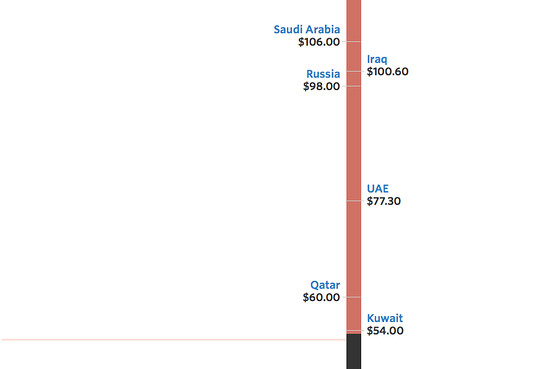The International Monetary Fund estimates the Middle East's oil-dependent economies have missed out on $390 billion in oil revenues last year alone and face up to $150 billion in income losses this year as a result of cheap oil prices.
The drop in revenues stemming from the export of oil is the direct result of the plunge in crude prices from around $115 a barrel in the middle of 2014 to below $30 at the start of the year and now above $40, the IMF said.
The loss in potential revenues has put an enormous strain on the economies of major oil exporters such as Saudi Arabia and Kuwait who have posted massive budget deficits in the past year. The IMF had previously calculated that the declining energy prices would erase around $360 billion in oil receipts.
To overcome these gaping budget deficits, Persian Gulf countries have introduced a raft of measures ranging from cutting energy subsidies to raising taxes. Some, such as Saudi Arabia, have also burned through their foreign reserves or started to borrow internationally to ease the fiscal pressures.
"2016 is year number two in a multi-year adjustment process to reach balanced budgets," said Masood Ahmed, director of the IMF's Middle East and Central Asia Department. "Probably another four to five years of action will be needed both on spending and on revenues before reaching a comfortable fiscal situation for many countries," he said.
Economic growth for the region's oil exporters is set to rise to 3% in 2016 from 2% last year but that is mainly due to the improved prospects of Iraq, which increased oil production, and Iran, which is looking to benefit from the gradual lifting of sanctions, the IMF said.
For the oil-rich Persian Gulf countries, economic activity is expected to further slow as governments are cutting spending to rein in widening budget deficits.
Mr. Ahmed of the IMF describes the Gulf's response to the low oil prices as "quite determined" but calls on these countries to abandon the economic model whereby the state is the biggest provider of jobs in favor of a system where the private sector plays a bigger role in creating jobs. He cites the examples of Malaysia, Indonesia and Chile as countries which have successfully reduced their dependence on energy resources.
The IMF estimates that the oil exporting countries in the Middle East will see 10 million young people being added to the workforce in the next five years. Mr. Ahmed warns that the current pace of job creation is insufficient to absorb the new labor market entrants.
"If jobs continue to be created at the same rate as in the last few years, you will end up with 3 million (additional) unemployed by the end of this five-year period," Mr. Ahmed said. The IMF estimates average youth unemployment to be around 20% in the region.
"The model that we need to go to is one where not all the nationals look for work in the public sector and the state is not just a primary provider of jobs," Mr. Ahmed said.
www.ann.az
Follow us !











